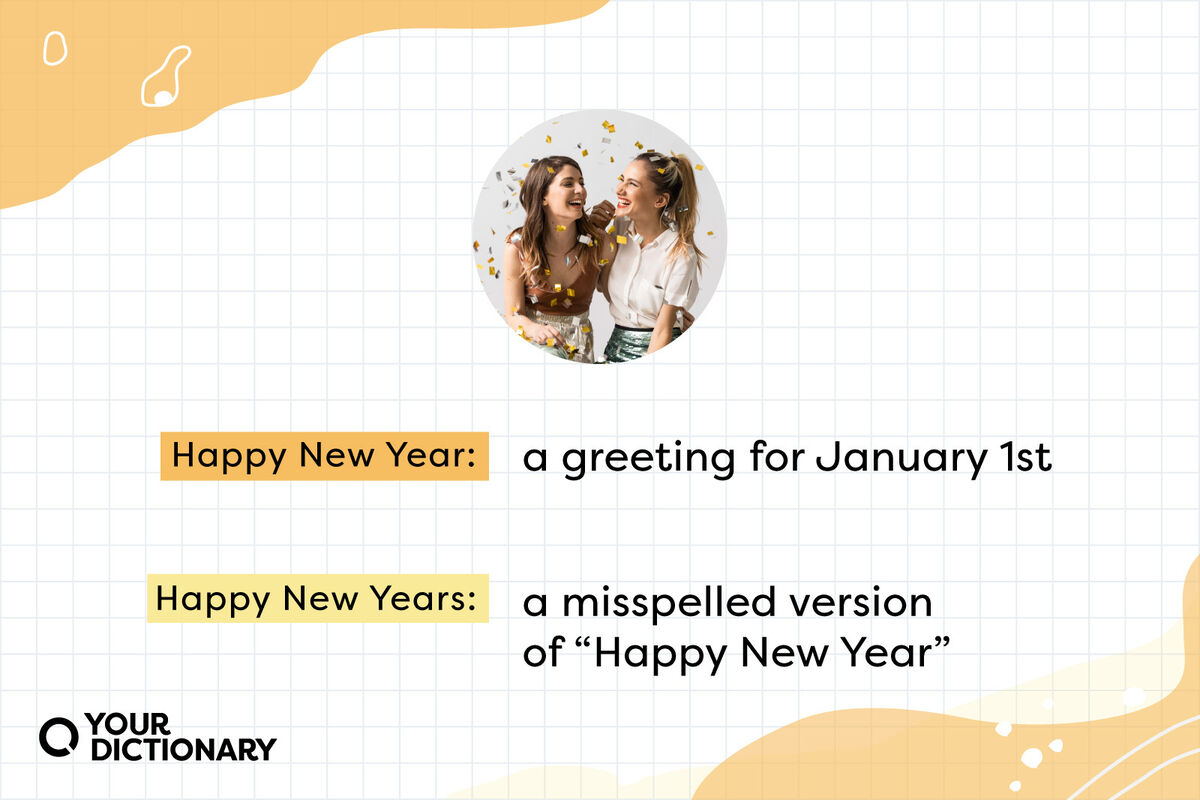
Every January 1st, we all have the opportunity to start fresh. But we also have a hidden grammatical opportunity: We can either wish party-goers and resolution-makers a “Happy New Year!” or a “Happy New Years!” If they both sound equally correct, don’t worry — soon the incorrect version will sound more like a squawking noisemaker than a proper greeting.
Is It “Happy New Year” or “Happy New Years”?
When wishing someone a nice start to the year, you say “Happy New Year!” Notice the lack of an “s,” primarily because there’s only one new year involved.
Based on plural noun rules, if you say “Happy New Years!” you’re wishing someone many new years to come (which is considerate, but probably not what you mean).
When Should You Use “New Year’s”?
Even though Happy New Years isn’t correct, there are many times when you should use New Year’s (with the apostrophe). They include:
- New Year’s Eve
- New Year’s Day
- New Year’s party
- New Year’s resolutions
- New Year’s traditions
- New Year’s baby
New Year’s functions as a possessive noun in these cases, since the Eve, the Day, the party, the resolutions, and the traditions belong to the New Year. That’s why saying “Happy New Year’s Eve” is correct.
Shortening “New Year’s Eve” to “New Year’s”
Sometimes, people use New Year’s as a shortened version of New Year’s Eve (as in “I’ll see you on New Year’s!"). However, this usage only refers to December 31, the day before New Year’s Day — and it never becomes “Happy New Year’s!” (or “Happy New Years!”).
Is “Happy New Year” Capitalized?
Both of the days associated with the new year (New Year’s Eve and New Year’s Day) are holidays, so they are always capitalized. But what about “Happy New Year”?
When it functions as a full sentence, you capitalize all three words in “Happy New Year.” But when it appears in the middle of a sentence, the rule may be different because happy is functioning as a normal adjective, not a greeting. For example:
- “Happy New Year!” Matilda exclaimed.
- “I hope you have a happy New Year,” said Martin.
When “New Year” Isn’t Capitalized
When you’re discussing the new year as a year, not a holiday, you don’t need to capitalize it. For example:
- We need to settle this account early in the new year.
- Laura decided to move sometime in the new year.
In these cases, new year doesn’t refer to January 1st — it refers to some period of time within the 365 days of the new year on the calendar.
More Special Days With a Sneaky “S”
The phrase Happy New Year isn’t the only time when people get confused about the letter “s” and apostrophes. Consider these preferred spellings from the AP Stylebook:
- Veterans Day (not Veteran’s Day)
- Presidents’ Day (not President’s Day or Presidents Day)
- Mother’s Day (not Mothers’ Day or Mothers Day)
- Father's Day (not Fathers’ Day or Fathers Day)
- daylight saving time (not daylight savings time)
For holidays where the only difference is apostrophe placement, it only matters if you use the correct version in writing (since people can’t hear your apostrophes). But in cases like “Happy New Year,” where an “s” doesn’t belong, you’re better off knowing the correct way to say it. (Unlike all of us who are singing "Auld Lang Syne" incorrectly.)